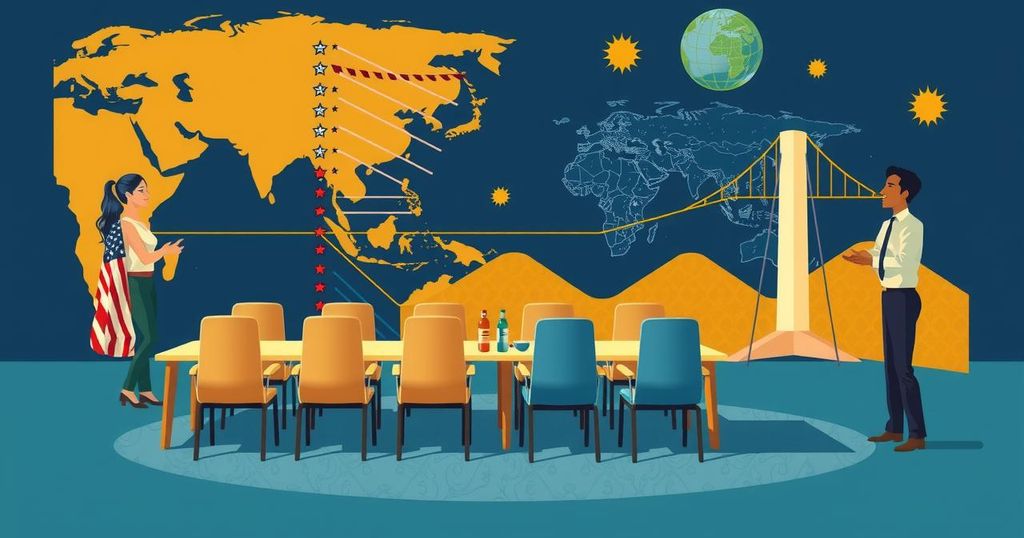World news
ABC NEWS, ABREGO GARCIA, ASIA, BRAZIL, BUKELE, CNN, DISTRICT COURT, EL SALVADOR, HONOLULU, JUDICIARY, JUSTICE DEPARTMENT, LAW, MAN, MARYLAND, NAY, NEW YORK TIMES, NORTH AMERICA, PHILIPPINES, POLITICS, SALVADOR, SOUTH AMERICA, SUPREME COURT RULING, TRUMP, TRUMP ADMINISTRATION, U. S, U. S. DISTRICT COURT, UNITED STATES, WASHINGTON, WHITE HOUSE
Ethan Kim
0 Comments
Trump Declines Communication with El Salvador on Deportation Case
President Trump stated he has not contacted El Salvador regarding Kilmar Abrego Garcia’s return after his wrongful deportation. U.S. Secretary of State Marco Rubio avoided discussing alleged communications with Bukele. Garcia, a Salvadoran with a valid U.S. work permit, was deported despite court orders, raising significant due process concerns. Critics warn this reflects a troubling disregard for constitutional rights.
In recent statements, President Donald Trump asserted that he has not communicated with El Salvador’s President Nayib Bukele regarding the case of Kilmar Abrego Garcia, a man mistakenly deported from Maryland. During a news interaction at the White House, Trump remarked, “I don’t know. I haven’t spoken to him,” when questioned about Bukele potentially rejecting a request for Garcia’s return.
Trump also indicated that the legal matters regarding this situation are best left to the lawyers, despite an April Supreme Court order directing his administration to facilitate Garcia’s release. Interestingly, in a preceding interview with ABC News, Trump mentioned that he could arrange for Garcia’s return with a simple phone call but chose not to do so. This steadfast position comes amidst claims that only the Salvadoran government can make a move in this matter.
Reports have emerged suggesting that U.S. Secretary of State Marco Rubio had been in touch with President Bukele regarding the deportation. However, Rubio, while attending a Cabinet meeting with Trump, refused to comment on the discussions, stating, “I’ll never discuss it”. Meanwhile, responses have been lacking from both the U.S. Department of Homeland Security and El Salvador’s presidential office concerning inquiries about these diplomatic communications.
Specifically, Kilmar Abrego Garcia, who is 29 years old, was detained in March under allegations of gang associations, though he was living legally in Maryland with a work permit. He was subsequently deported despite a protective order, which purportedly allowed him to remain in the country. Legal experts and Democratic lawmakers have highlighted this incident as critical to evaluating the broader implications for due process rights.
Critics—such as Senator Chris Van Hollen from Maryland—have raised alarms that Trump’s disregard for court orders could potentially undermine the constitutional rights of all individuals residing in the United States. Van Hollen emphasized, “If Donald Trump can ignore court orders and trample over the rights of one man, he threatens the rights of everyone who lives in the United States.”
While Trump has received substantial support for his immigration stance, public opinion seems to show division. Although his immigration policies have fueled strong backing, polling indicates a split among respondents concerning his effectiveness on this issue. A considerable number of people expressed that Garcia should be allowed to return, contrasting with Trump’s hardline approach.
Furthermore, advocates for other deported migrants are urging the courts to enable their return as well. Meanwhile, Rubio confirmed that the Trump administration is exploring agreements with additional countries to accept deported individuals, having already established a deal with Uzbekistan. In an unrelated ruling today, a U.S. judge mandated that the administration ensure due process for migrants held at Guantanamo Bay.
In summary, President Trump’s lack of communication with El Salvador regarding Kilmar Abrego Garcia’s deportation raises significant questions about due process and legal compliance. While he claims the legalities are up to the lawyers, the ongoing controversy highlights broader implications for immigrants’ rights under his administration. As public opinion remains mixed on Trump’s immigration policies, the case continues to garner attention from legal experts and lawmakers alike, questioning the administration’s approach to foreign relations and human rights.
Original Source: www.staradvertiser.com




Post Comment